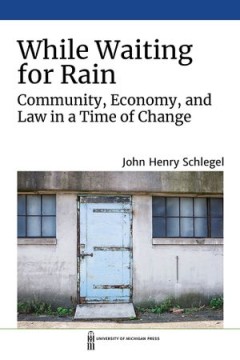Filter by

Advances in Production Technology
Manufacturing, Machines, Tools; Production/Logistics/Supply Chain Management; Machinery and Machine Elements
- Edition
- -
- ISBN/ISSN
- 9783319123035
- Collation
- -
- Series Title
- -
- Call Number
- 650

Accountability in Public Policy Partnerships
Public-private partnerships have become an important tool for delivering essential public goods, but critics fear that they erode public accountability. Making partnerships more accountable requires a clear understanding of what accountability means for partnerships and which mechanisms can be used to strengthen it. Accountability in Public Policy Partnerships develops a new model of accountabi…
- Edition
- -
- ISBN/ISSN
- 9780230238978
- Collation
- -
- Series Title
- -
- Call Number
- 650

While Waiting for Rain : Community, Economy, and Law in a Time of Change
What might a sensible community choose to do if its economy has fallen apart and becoming a ghost town is not an acceptable option? Unfortunately, answers to this question have long been measured against an implicit standard: the postwar economy of the 1950s. After showing why that economy provides an implausible standard—made possible by the lack of economic competition from the European and…
- Edition
- -
- ISBN/ISSN
- 9780472902972
- Collation
- -
- Series Title
- -
- Call Number
- 650

A Study of Crisis
As the twentieth century draws to a close, it is time to look back on an epoch of widespread turmoil, including two world wars, the end of the colonial era in world history, and a large number of international crises and conflicts. This book is designed to shed light on the causes and consequences of military-security crises since the end of World War I, in every region, across diverse economic…
- Edition
- -
- ISBN/ISSN
- 9780472903122
- Collation
- -
- Series Title
- -
- Call Number
- 650

The Japanese Automotive Industry Model and Challenge for the Future?
- Edition
- -
- ISBN/ISSN
- -
- Collation
- -
- Series Title
- -
- Call Number
- -
- Edition
- -
- ISBN/ISSN
- -
- Collation
- -
- Series Title
- -
- Call Number
- -

Industry at the Crossroads
International communication as a field of inquiry is, in fact, not very “internationalized.” Rather, it has been taken as a conceptual extension or empirical application of U.S. communication, and much of the world outside the West has been socialized to adopt truncated versions of Pax Americana’s notion of international communication. At stake is the “subject position” of academic an…
- Edition
- -
- ISBN/ISSN
- 9780472902040
- Collation
- -
- Series Title
- -
- Call Number
- 650

Surrender : How the Clinton Administration Completed the Reagan Revolution
Michael Meeropol argues that the ballooning of the federal budget deficit was not a serious problem in the 1980s, nor were the successful recent efforts to get it under control the basis for the prosperous economy of the mid-1990s. In this controversial book, the author provides a close look at what actually happened to the American economy during the years of the "Reagan Revolution" and reveal…
- Edition
- -
- ISBN/ISSN
- 9780472900732
- Collation
- -
- Series Title
- -
- Call Number
- 650

Broadcasting, Voice, and Accountability A Public Interest Approach to Policy…
Participatory development and government accountability depend in part on the existence of media that provide broad access to information from varied sources and that equip and encourage people to raise and debate issues and develop public opinion. Conducive policies, laws, and regulations are essential for media to develop that are independent and widely accessible and that enable the expressi…
- Edition
- -
- ISBN/ISSN
- 9780472900466
- Collation
- -
- Series Title
- -
- Call Number
- 650

Automobiles and the Future : Competition, Cooperation, and Change
At the time of the U.S.-Japan auto conferences in March 1983, the hoped-for economic recovery as manifested in auto sales had revealed itself quite modestly. Three months later, the indicators were more robust and certainly long overdue for those whose livelihood depends on the health of the industry--some of whom are university professors. With Japanese import restrictions in place until Ma…
- Edition
- -
- ISBN/ISSN
- 9780472902088
- Collation
- -
- Series Title
- -
- Call Number
- 650

The law in the information and risk society
The information and risk society poses a new challenge for the law in all its fragments. Modern media communication and technologies increase people’s prosperity while stating new risks with not uncommonly devastating crisis-potential: The banking crisis, the safety net for the euro zone and the nuclear incident in Fukushima are only the latest forms of those specific modern common dangers wh…
- Edition
- -
- ISBN/ISSN
- 9783863950125
- Collation
- -
- Series Title
- -
- Call Number
- 650
 Computer Science, Information & General Works
Computer Science, Information & General Works  Philosophy & Psychology
Philosophy & Psychology  Religion
Religion  Social Sciences
Social Sciences  Language
Language  Pure Science
Pure Science  Applied Sciences
Applied Sciences  Art & Recreation
Art & Recreation  Literature
Literature  History & Geography
History & Geography